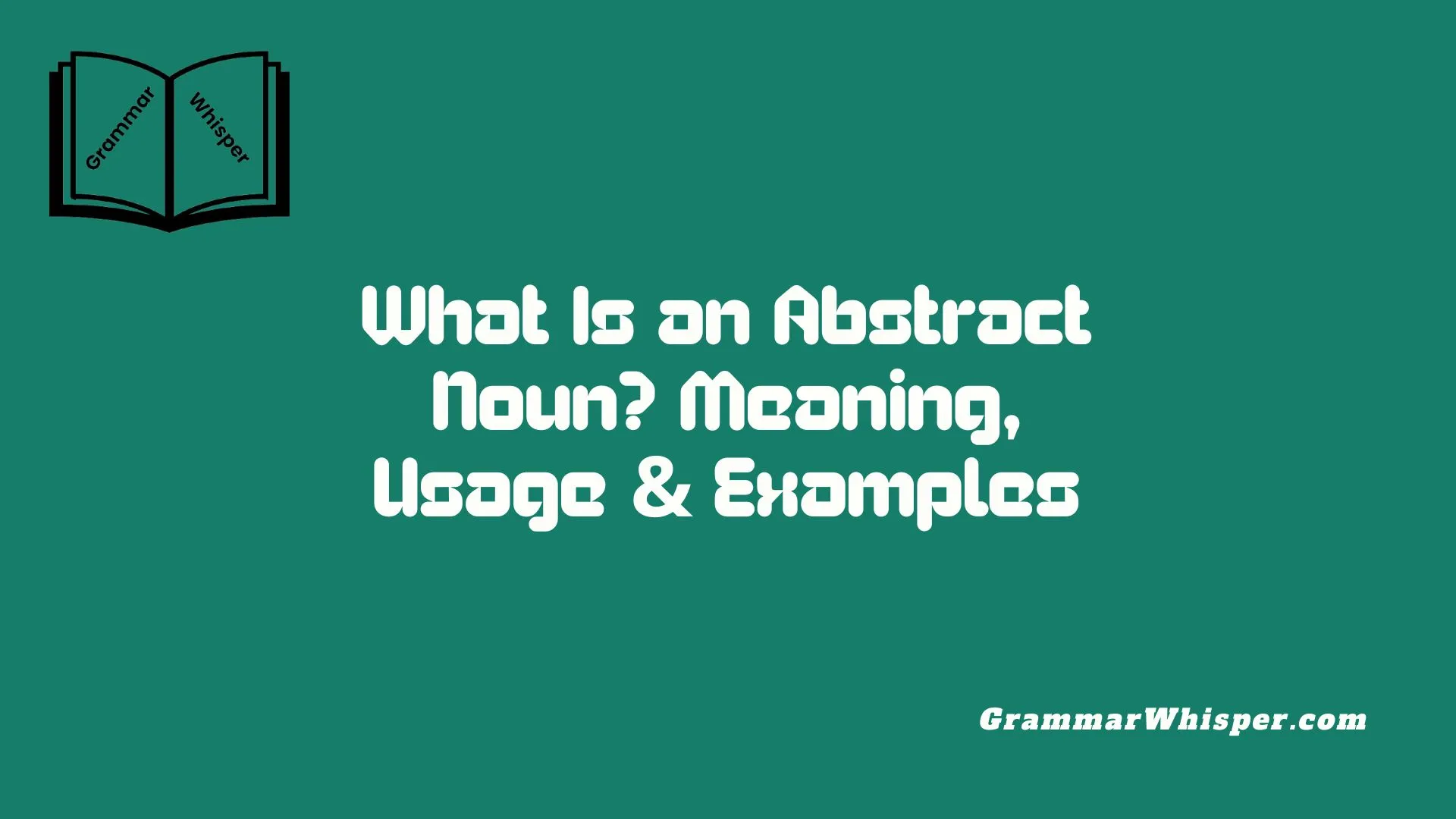It’s always a challenge when learners, especially native speakers, try to grasp the idea of an abstract noun. A chair is easy – you can touch it. But a dream, a hope, or a feeling? That’s different. These are invisible ideas, the kind you can’t see but deeply know. Abstract nouns let us argue beliefs, write our thoughts, and enrich everyday communication. They deepen our understanding of grammar, sharpen our style, and help us spot meaning in every sentence.
In my learning journey, a helpful guide once walked me through simple examples that just clicked. I remember thinking how the word “tricky” no longer applied. I began to recognize how language works – how we think, feel, and dream in words we can’t see. That moment felt like magic. Suddenly, everything made sense. And when you write with that kind of clarity, you’re not just filling pages. You’re naming what truly matters.
What Are Abstract Nouns? A Clear and Simple Definition
An abstract noun refers to something that cannot be seen, touched, smelled, tasted, or heard – something you feel, think, or know exists, but it’s not tangible.
Definition:
“An abstract noun is a noun that refers to an idea, quality, state, or concept rather than a physical object.”
Examples:
- Freedom
- Love
- Knowledge
- Strength
- Happiness
Unlike concrete nouns (like “table” or “cat”), abstract nouns are intangible. They deal with things that live in the mind or emotions, not in the physical world.
Why Abstract Nouns Matter in English
Abstract nouns play a powerful role in communication. They allow us to talk about feelings, values, dreams, and concepts that make us human.
Why They Matter:
- Express emotions: “Her anger was justified.”
- Share experiences: “The journey taught me patience.”
- Convey values: “They fought for justice.”
- Create arguments and logic: “This decision lacks reason.”
In persuasive writing, storytelling, public speaking, and debate – abstract nouns give your words depth.
Sensing the Invisible: How Abstract Nouns Differ from Concrete Ones
Here’s the difference in the simplest terms:
| Type | Description | Examples |
| Concrete Noun | Something you can see/touch/hear | book, apple, engine, flower |
| Abstract Noun | Something you feel/think but can’t touch | peace, intelligence, pride |
Quick Tip:
If you can’t experience it with your senses, it’s likely an abstract noun.
Example:
- “She has immense patience.” ← Abstract
- “She gave me a watch.” ← Concrete
Categories of Abstract Nouns: Breaking It Down
Abstract nouns aren’t just a big vague group. They can be organized into meaningful categories.
1. Emotions
- Joy
- Anger
- Sadness
- Fear
- Surprise
These describe how we feel inside, even if we don’t show it outside.
2. States or Conditions
- Childhood
- Death
- Sleep
- Misery
- Health
They represent conditions of existence, often over time.
3. Qualities
- Honesty
- Courage
- Wisdom
- Kindness
- Strength
These refer to traits we admire or criticize.
4. Ideas and Concepts
- Justice
- Faith
- Democracy
- Philosophy
- Evolution
Often used in essays, debates, or theories, they form the backbone of belief systems.
5. Time and Movement
- Progress
- Delay
- Future
- Eternity
- Moment
These are temporal or movement-based abstractions.
Abstract Nouns in Real-World Language
Abstract nouns show up in real conversations, essays, podcasts, speeches, even memes. You’re likely using them every day.
Real-Life Usage:
“Their loyalty during hard times was admirable.” “He lacks the discipline to succeed.” “They argued over morality in politics.”
You’ll also find them in:
- Social media captions: “Chasing happiness, not things.”
- News headlines: “Leaders call for unity after crisis.”
- Emails: “Thanks for your patience.”
Pro Tip:
Using abstract nouns well can make your writing feel deeper and more personal.
Abstract Nouns vs. Concrete Nouns: Understand the Difference
Here’s a practical way to compare:
| Abstract Noun | Concrete Counterpart |
| Fear | Snake |
| Success | Trophy |
| Freedom | Passport |
| Anger | Yelled words |
| Love | Hug |
Sentence Example:
- “She has love in her heart.” (abstract)
- “She gave him a rose.” (concrete)
Understanding this contrast helps learners clarify meaning and refine usage.
How Abstract Nouns Are Formed: Suffixes and Word Roots
Most abstract nouns are formed by adding suffixes to verbs or adjectives.
Common Suffixes:
| Suffix | Example (Base Word → Abstract Noun) |
| -tion | Act → Action, Create → Creation |
| -ment | Develop → Development, Govern → Government |
| -ness | Kind → Kindness, Sad → Sadness |
| -ity | Active → Activity, Humid → Humidity |
| -ance/-ence | Tolerate → Tolerance, Differ → Difference |
You can often identify abstract nouns by spotting these endings.
Patterns:
- Verb → Noun: Decide → Decision
- Adjective → Noun: Brave → Bravery
Quick Identification Techniques: Spotting Abstract Nouns Instantly
Here’s a fast system to test if a noun is abstract:
The “Five Senses Rule”:
If you can’t see, hear, touch, taste, or smell it → Abstract
The “Emotion & Thought Rule”:
If it’s a feeling, idea, or condition, it’s likely abstract
The “Suffix Scan”:
Look for words ending in -tion, -ment, -ness, -ity, -ance, -ence
Spot-the-Noun Practice:
Which of these are abstract?
- Table, Hope, Celebration, Glass, Liberty
✅ Correct Answer: Hope, Celebration, Liberty
Interactive Examples: Abstract Nouns in Context
Let’s make it practical.
Fill-in-the-Blank:
“Despite the chaos, she remained full of ______.” Choices: laughter, patience, coffee, shoes ✅ Answer: patience
Sentence Rewrite:
Original: “He won the race.” With Abstract Noun: “His determination led him to victory.”
Paragraph Rewrite:
Original: “She helped. He was thankful.” Rewritten: “Her generosity earned his gratitude.”
This is how abstract nouns enrich basic statements.
Cultural, Historical, and Philosophical Ideas as Abstract Nouns
Abstract nouns are crucial when talking about movements, systems, and beliefs.
Examples from Culture:
- Renaissance – a revival of art, learning, and culture
- Nationalism – a sense of national identity
- Freedom – a core principle in democracy
In Speeches:
“We hold these truths to be self-evident, that all men are created equal…” – Equality and truth are abstract nouns with massive impact.
They give meaning to revolutions, constitutions, and human rights movements.
Worksheets and Classroom Activities
If you’re a teacher, tutor, or learner, here are some activities.
Worksheet Ideas:
- Match the abstract noun to a related verb or adjective
- Circle the abstract nouns in a passage
- Write a story using at least five abstract nouns
Compare abstract and concrete nouns in a chart
Activity Example:
| Verb | Abstract Noun |
| Decide | Decision |
| Govern | Government |
| Educate | Education |
| Argue | Argument |
Beyond English: Abstract Nouns in Other Languages
Understanding abstract nouns helps when learning other languages too.
Examples in Other Languages:
| Language | Abstract Noun (Translation) | Meaning |
| Spanish | Libertad | Freedom |
| French | Confiance | Trust |
| Arabic | Salam | Peace |
| Japanese | Kansha (感謝) | Gratitude |
Some languages even have abstract nouns with no direct English equivalent – a fascinating lens into cultural thinking.
Wrap-Up: Building Mastery with Abstract Nouns
Abstract nouns shape how we express emotions, convictions, values, and states of being. They’re essential to both spoken and written English, offering depth and complexity to even the simplest messages.
To master them:
- Read widely and notice abstract nouns in use
- Practice using them in your own sentences
- Mix them with concrete nouns for balanced writing
- Don’t be afraid to think deeply – abstract nouns often carry emotion and intellect at once
If you’re a learner, writer, educator, or language enthusiast, knowing what an abstract noun is unlocks powerful doors in language. These nouns might be invisible – but they shape everything you say and mean.
Final Thoughts
Abstract nouns may be invisible, but they’re anything but unimportant. They’re the backbone of emotion, thought, belief, and communication – especially when we need to express what can’t be seen but deeply felt. Whether you’re writing a heartfelt letter, analyzing literature, giving a speech, or simply describing how you feel, abstract nouns help you do it with precision and power.
Understanding abstract nouns goes far beyond grammar rules. It’s about gaining the tools to express intangible ideas clearly. From describing freedom to debating morality, these nouns give your language depth, style, and sophistication. The more you use them purposefully, the more compelling your communication becomes.
FAQs
What is an abstract noun in simple words?
An abstract noun is a word that refers to something you can’t see, touch, hear, smell, or taste, like a feeling, quality, or idea. Examples include happiness, freedom, and truth.
How do you identify an abstract noun in a sentence?
If a noun refers to something you can’t physically experience, and it’s often linked to emotions, states, or concepts, it’s abstract. Look for common suffixes like -tion, -ness, or -ity to help spot them.
What’s the difference between abstract and concrete nouns?
Abstract nouns refer to intangible things (like love or wisdom), while concrete nouns refer to physical things you can sense (like apple or book).
Why are abstract nouns important in writing and speech?
They let you express complex ideas, emotions, and values. Without them, you’d struggle to discuss things like justice, trust, or creativity – all essential for effective communication.
Can a word be both abstract and concrete depending on context?
Yes, context matters. For example, “experience” can be abstract when talking about knowledge gained, but more concrete when referring to a specific event:
“She has experience in finance.” (abstract) “That was a fun experience.” (more concrete)











